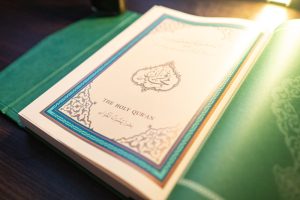Is a book even worth reading if it does not instantly speak to our interest? As a society we have sadly answered in the negative. As general interest in reading gradually plummeted1 sections on classics and holy scriptures in modern libraries shrank, giving way to everything from Japanese anime to pop-stars’ personal biographies. These bested their traditionalist rivals both in physical space on book shelves as well as popularity.
Where did the profound significance and sublime inspiration that holy scriptures once held go? Perhaps the widening fissure between sanctified scripture and sensible science was ignored for so long, we simply accepted that the effort and reflection needed to reconcile the two was a toil not worth our newfound comforts. To compare, it takes the touch of a tablet to resume the latest Netflix series versus a laborious attempt at uncovering new lexical meanings for classical and complicated words. Consequently, taking for granted that the words we venerably attributed to God must not be so significant to modern life, we created the perfect ground to ask: Is God’s word even relevant today?

In the recent past, a prodigiously inquisitive young man faced the exact same intellectual roadblock even when earnestly reading what he believed to be God’s word: The Holy Qur’an. His incessant yet ingenious queries often left his spiritual mentors – themselves most established intellectuals – highly unnerved. This was Hazrat Mirza Bashiruddin Mahmud Ahmadra, who was the second successor of the Promised Messiahas and the second worldwide head of the Ahmadiyya Muslim Community. Realising the new age’s objections to the Holy Qur’an, the young Mirza Bashiruddin Mahmud Ahmadra began dedicating long hours to prayers. Some time after these heartfelt supplications, while hardly still a youth, he met an angel in his dream. The angel, Hazrat Mirza Bashiruddin Mahmud Ahmadra narrates, commenced teaching him Qur’anic commentary. Despite having forgotten almost all the words of the angel, the spiritual experience granted him conviction that it would be God Himself Who would teach him the true meaning of His words. This was to become his destiny. A destiny to bring together in perfect harmony both the Word and deed of God. It was this lifelong reflection and research that came to be known as At-Tafsīr-ul-Kabīr [The Grand Exegesis].
From his childhood, the young Mirza Bashiruddin Mahmud Ahmad’sra aptitudes and interests – as foretold to his father – reflected precisely the mind that would go on to produce one of the greatest modern commentaries of any religious scripture. His revered teacher, Hazrat Maulvi Hakim Nuruddinra, himself a saint and scholar of the loftiest order at the time, who was the first Khalifah [Caliph] of the Ahmadiyya Muslim Community, would openly assert in front of entire gatherings – only after the modest affirmation of his accomplished pupil – ‘See! Allah talks to our Mian [Mirza Bashiruddinra] as well.’2 His tender age did not in the least fall short from reflecting lustrously ‘the light of Allah’ that had been promised with his advent. Divine inspiration, commencing in his childhood, remained for the whole of his life, the fundamental elucidator to his remarkable Qur’an exegesis.
‘He…will be filled with secular and spiritual knowledge’ were the words prophesying his intellectual disposition. Fulfilling the prophetic words to the letter, he excelled above all others in grasping the core of the most complex issue, simplifying its content for the layman. This brilliance is exemplified in the writing of his famous commentary of the Holy Qur’an. Every word of every sentence on every one of its more than ten thousand pages is suffused with his passion for the veracity of the text, rationality of meaning and profound relevance to every imaginable secular as well as spiritual human experience. One of his beloved daughters, Amatul Jameel, relates that long into the nights, when everyone had gone to sleep in the house, he would stay up. Seated on the cold bare floor with heaps of books and pages at his side, he would pen his works of commentary with the loving hope that his community should discover the truth of God’s word. Hazrat Mirza Bashiruddin Mahmud Ahmad’sra stimulating exposition of Qur’anic text, gave new life in the minds of millions to the sacret words that had been presented in erroneous narratives in the past.
From scientifically reconciling the metaphorical presentation of the creation of the universe to explaining Moses’as ‘splitting of the sea’ as an empirically acceptable tidal phenomena, his take on scripture translates traditional concepts for a modern audience.
But his revolutionary scientific and philosophically inquisitive line of thought never lost the spiritual compass which he himself believed was the real source of his brilliance. Hazrat Mirza Bashiruddin Mahmud Ahmad’sra own worldview on the subject accepted the human incapacity to realise the meaning of any religious text without spiritual inspiration. ‘A Muslim is only required to read the translation and understand it thoroughly.’3 He said, ‘The rest of the knowledge comes through God-given insight. For that, one must make the necessary effort and seek it from Allah.’4
And while he attributed his knowledge directly to God, his motivation and purpose for penning the incredible compendium was the ardent desire that humankind should give it attention and benefit from its every word.
The Review of Religions is proud to publish the exclusive serialisation of the English translation of At-Tafsīr-ul-Kabīr.
…………………………………………………..
About the Author: Basil Raza Butt is a recent graduate of Jamia Ahmadiyya Canada (the Ahmadiyya Muslim Community’s training seminary for missionaries).
…………………………………………………..
Endnotes
1. Peter Toohy, Ph.D., “Don’t People Enjoy Reading Anymore?” Psychology Today, accessed January 9, 2019, https://www.psychologytoday.com/gb/blog/annals-the-emotions/201807/don-t-people-enjoy-reading-anymore.
2. Mujeebur Rahman, Fazl-e-Umar (Islam International Publications Ltd., 2012), 112.
3. Mujeebur Rahman, Fazl-e-Umar (Islam International Publications Ltd., 2012), 48.
4. Ibid.




Add Comment